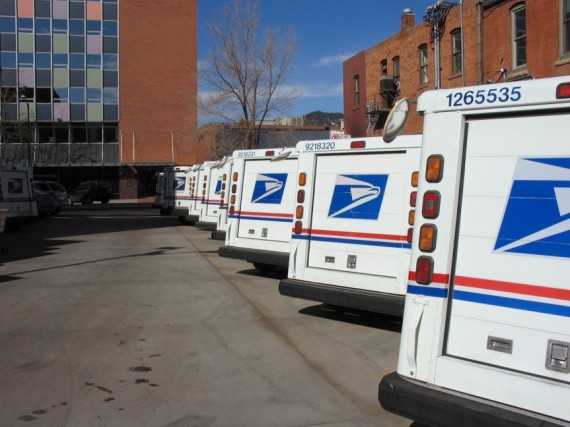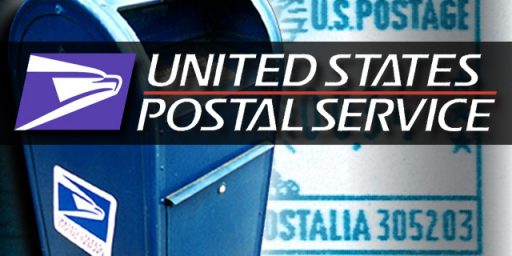USPS Loses $ 8.5 Billion, Warns Of Bankruptcy
The U.S. Postal Service is warning Congress that it could run out of cash next year without a government bailout. Meaning that this is the perfect opportunity to reform an organization that has been out-of-date for a decade now.
The United States Postal Service is fast approaching the point where, if it were an ordinary business, we’d be talking about Chapter 11 Bankruptcy:
The financially troubled U.S. Postal Service reported an $8.5 billion loss in the fiscal year that ended in September and said it will run out of money in 2011 if economic conditions don’t improve and Congress doesn’t act.
A drop in first-class mail deliveries contributed to an overall 6 billion-piece decline in mail volume last fiscal year, to 170.6 billion pieces, officials said. Financial losses also came from about $5.4 billion in obligations to pre-fund retiree health benefits and about $2.5 billion paid to the federal government’s workers’ compensation insurance fund.
All federal agencies and the USPS, a quasi-federal outfit, have workers’ compensation obligations to help fund four major disability compensation programs.
The Postal Service also announced Friday that it plans to deplete its $15 billion line of credit with the U.S. Treasury by borrowing the remaining $3.5 billion. Although the Postal Service does not use taxpayer funding, it has tapped the credit line since the early 1990s. Depleting it means the Postal Service probably will go broke at the end of fiscal 2011 unless Congress takes action, members of the Postal Service Board of Governors said Friday.
The historic losses occurred despite more than $9 billion in cost cuts in the past two years, including the elimination of about 105,000 full-time jobs, “more than any other organization, anywhere,” USPS Chief Financial Officer Joe Corbett said Friday.
“We will continue our relentless efforts to innovate and improve efficiency. However, the need for changes to legislation, regulations and labor contracts has never been more obvious,” Corbett said.
The problem, of course, is that as long as the USPS remains a “quasi-governmental entity” it will be unable to undertake the types of reforms that any other business would in the face of the fundamental transformation of its business model, something that has been going on for nearly a decade now. Instead, much like the auto companies, the Postal Service finds itself weighed down by government regulation, and by union contracts that require them to pay people even if they don’t work at all:
The U.S. Postal Service, struggling with a massive deficit caused by plummeting mail volume, spends more than a million dollars each week to pay thousands of employees to sit in empty rooms and do nothing.
It’s a practice called “standby time,” and it has existed for years — but postal employees say it was rarely used until this year. Now, postal officials say, the agency is averaging about 45,000 hours of standby time every week — the equivalent of having 1,125 full-time employees sitting idle, at a cost of more than $50 million per year.
Mail volume is down 12.6 percent compared with last year, and many postal supervisors simply don’t have enough work to keep all employees busy. But a thicket of union rules prevents managers from laying off excess employees; a recent agreement with the unions, in fact, temporarily prevents the Postal Service from even reassigning them to other facilities that could use them.
So they sit — some for a few hours, others for entire shifts. Postal union officials estimate some 15,000 employees have spent time on standby this year.
They spend their days holed up in rooms — conference rooms, break rooms, occasionally 12-foot-by-8-foot storage closets — that the Postal Service dubs “resource rooms.” Postal employees use more colorful names, like “holding pens” and “blue rooms.”
“It’s just a small, empty room. … It’s awful,” said one mail processing clerk who has spent four weeks on standby time this summer. “Most of us bring books, word puzzles. Sometimes we just sleep.”
The rational business response to this phenomenon, which is entirely created by the same decline in mail volume that is impacting the USPS at all levels, would be to let employees go. However, thanks to the generous employment and benefit packages that the Postal Worker’s Union has extracted, the only option the USPS has is to offer employee buyouts, which of course cost money and add to the organization’s financial woes.
Long term, it’s fairly clear that the only option for the USPS is to follow the route that David Cameron is advocating for the Royal Mail in England, privatization:
Vincent Cable, the Liberal Democrat Business Secretary, said the Government was planning sell off all of its shares in the company in a move which is likely to be bitterly opposed with unions and left wing Labour MPs.
Most of the shares will be sold to outside investors – either to private companies or through a public share offering.
A small stake – possibly as much as 20 per cent – will be left in the hands of workers to buy their support for privatisation, as disclosed by The Daily Telegraph yesterday.
(…)
The announcement came after Richard Hooper, the Government’s independent postal service reviewer, published a report on the Royal Mail and warned that its finances had worsened over the past 18 months and that “without serious action” the company would “not survive in its current form”.
The relationship between the government and the mail service is different in the U.K. than it is here, but the general concept is still applicable. We are far past the point where a single organization ought to have a government-protected monopoly over non-parcel, non-express mail delivery. Both UPS and FedEx have proven themselves capable of fulfilling roles that the Postal Service used to perform, and in FedEx’s case their business started out by creating a service that USPS had never even thought of and probably would not have been able to implement on its own.
The only other option would seem to be throwing more taxpayer money into a business model that is becoming increasing irrelevant in an era when information of all kinds is delivered far faster, and far more efficiently, than it ever possibly could be by a guy in blue shorts. That makes no sense at all.







I honestly see very little need for a government run USPS at this point in time. I do think perhaps there may need to be some built in incentive to a private company to maintain delivery to rural areas (which is my only real concern with privatization-that rural delivery may not be profitable enough and would fall away).
I would be fine with some type of privatization, although I don’t think the government is going to go for this solution.
just me,
As someone who grew up in a very rural area, and now lives in a large metropolitan, I can attest that the relationship between citizens and the USPS varies greatly by locale. So yes, some sort of protection for rural delivery, I think, would have to be made.
Other than that, reform away.
I’m not against USPS reform, though I do have one relative that makes his living as a postal carrier. Perhaps if the US Government paid back th $75 billion the post office overpaid into its pension fund, things wouldn’t be so dire.
I think the only way the Post Office is “like” the auto companies is that they are on your “things I don’t like” list.
For something truly “like” you better go to something with mandated universal service, like the utilities.
Btw, this is another “dog bites man” story. Of course the PO bumps along on the verge of BK. We don’t want them turning a real profit, so they walk a break even line that for-profit companies don’t shoot for.
So when they brush BK we adjust, the postage rates, or their mission.
SOP.
Perhaps the USPS is slipping in it’s efficiency, so why not institute a few austerity programs, then shut down the “Department of Education” and make the first year’s savings into a trust fund for the post office. That would cover the shortfall for at least ten years, maybe as much as sixteen years, depending on which budget figures you use.
If that is your pet department then pick one……
Department of Agriculture
Department of Commerce
National Intelligence Program
Department of Education
Department of Energy
Department of Health and Human Services
Department of Homeland Security
Department of Housing and Urban Development
Department of State and Other International Programs
Department of Transportation
Department of the Treasury
Department of Veterans Affairs
Corps of Engineers – Civil Works
Environmental Protection Agency
National Aeronautics and Space Administration
National Science Foundation
Small Business Administration
This is just a partial list and some of them even serve a usefull purpose, so…
Eliminate some and take a few percentage points away from most of the others.We’d then be swimming in dough , obviating all those impending tax increases and balancing the budget.
There are also other parasitic leaks in the federal budget which could be completely eliminated without feeling so much as a pinch… I.E…. “National Endowment for the Arts”
Does anybody here think that there is a legitimate point in here somewhere, or is every other government activity both efficient and necessary, while the USPS should be privatized?
The USPS is extremely top heavy. I have been retired for 10 years but when I was working in a very busy department, 2 shifts in two different cities. The clerk staff was cut from 12 to . When I retired there were 2 supervisors for 2 clerks and the supervisors still could not remember who was senior in the unit. This is insane but very common in USPS management.
I personally can’t wait to pay $3.29 to send a letter…..
So $7.9 billion of the $8.5 billion loss — i.e., 93% — comes from the benefits and compensation fund? Then why bother talking about the drop in mail volume? That’s like talking about the NEA when we’re discussing the federal budget deficits.
If 93% of their losses come from two sources, then the logical response is to address those sources before we deal with changing their business model. I’m not arguing that it’s wrong to change their business model in the internet age — that’s common sense — but it doesn’t seem to be the root of the problem here.
Even the “standby time” issue is only $50 million per year. Compared to the $5.4 billion in retiree health benefits, we’re talking about less than 1%. Can someone explain to me how changing the business model is going to plug this gap?
Should the pre-funding be considered a cash expense? Or somehow amortized?
Try paying $200 per month for health ins with $25 co-pays…106 per month for dental with $100 n$50 deductibles plus paying 20 to 50% for the service with a $1500 maximum! U say extravagant benefit package…I’m a sngle parent of 4 n I beg to differ! Whr r u gettin ur bogus info?! I agree with ones that say we are very topheavy…too much management that does not help get the job done and aren’t even allowed to make decisions without making a phone call. Poor management…not unions fault for wanting workers to be treated fairly! Wow…really?!
Here’s the USPS 2009 financials. The operating budget is about $75 billion and it’s noted that most of the deficit comes from the retiree pension and health fund.
Their deficit amount to a bit more than 10% of the operating budget and the same was apparently true last year. Sounds like a structural problem.
Aren’t there only two alternatives: raise more revenue or cut costs? It’s not entirely clear that they can increase revenue. I suppose there’s a certain amount of captive clientele but as you raise your prices you’re going to lose more of the rest.
There are now alternatives for nearly everything the USPS does. It’s not just mail and package delivery. You can send money orders via cell phone, too. So, ordinary mail, package delivery, bill paying, filing tax returns.
Netflix.com is one of the USPS’s largest customers if not the largest private customer—about 1% of revenues. Its delivery DVDs are probably a captive of the USPS but as the USPS increases prices won’t they pump their streaming service more?
I don’t see how the USPS’s problems aren’t a business model problem. The GAO said so in a report this year. Who am I to argue?
@ stephanie
$306 per month for health and dental insurance is damn cheap. My son can’t afford either because it cost almost four times that much several years ago.
Nevertheless, I think the postal service should raise rates for all the junk mail.
Dave I think you are right that at this point in time there isn’t really much the Postal service does that other don’t already do or can’t do.
the ability to do things electronically makes the USPS even more obsolete. I think the vast majority of our bills are paid electronically. I almodt never mail anything anymore. I think I purchased a book of stamps about 5 months ago and still have about half of them left.
I don’t see them cutting off their retiree benefits, so they are pretty much stuck. They can possibly revamp the benefits for the currently employed, but the union probably isn’t going to sign on for that one-at least not revamping them in a meaningful enough way to save money.
A labor intensive business, tailing off as a result of technological change, but with a large body of mature and retired workers, is a recipe for disaster. Any solution which reduces USPS volume just exacerbates the problem.
FWIW, remember that ending Saturday delivery “would save the Postal Service a forecasted $3.3 billion in its first year and about $5.1 billion annually by 2020. ”
http://www.chicagobreakingnews.com/2010/03/postal-service-end-saturday-delivery-in-early-2011.html
And the fact that USPS needs to get Congressional approval to make what seems to be an obvious business decision like ending Saturday delivery is, I think, another argument in favor of ending their “quasi-government” status
Doug, Doug, Doug.
You have that bee in your bonnet, but you haven’t really said what you need to say to make it work.
To end their “quasi-government” you have to say that you don’t support the goal of universal mail delivery, and that it is not necessary to the Republic.
(We roll government mandated monopolies a variety of ways in the country. None are perfect, but I’m happier with the USPS than I am with my government shielded cable TV/net provider.)
Fine John, I will say it — I do not think it is any longer a proper function of government to ensure “universal mail delivery”
Now everyone is free to call me a nihilist, or say I hate South Dakotans or something
AND of course, if you wound down the USPS, you’d still have those pension and healthcare obligations hanging. I’d hope you aren’t suggesting we stiff them?
(I think universal delivery is necessary, but daily delivery is not.)
I’m not suggesting “winding down” the USPS, I am suggesting ending its monopoly, decoupling it fully from the government, and letting it compete as a private entity. What other company needs to get Congressional approval to make a business decision? That’s just absurd
If you privatize and end universal service, it would inevitably wind down.
If the market cannot sustain the USPS, then I see no reason to keep it alive then.
Should we have subsidized the horse and buggy industry when cars were invented ?
Buggy whip manufacturers (a) extracted actual profit in the good days, (b) never had a universal mandate, and (c) could quit the business at their preference.
You keep proposing these weird non-parallels.
Just curious, without universal delivery, how would ballots go out? To someone who has to set up infrastructure for full delivery every few years, and then wind it down again?
I wonder though even ending Saturday delivery would really provide the profit margin the service needs.
I have no real issues with ending Saturday delivery, but the bulk of the cost of running the service is in paying for its retirees, not how often it delivers mail. Unless that issue is addressed the USPS will continue to hover on the brink of bankruptcy.
I do think there is a real risk though for rural delivery.
One could argue that the real problem is the fact that the old Post Office was partially privatized in the first place. If postal workers were simply seen as any other government worker, then their pension needs would not be any sort of a consideration when deciding how to structure the PO for the 21st century. The retirees would simply be part of the burden of the government as a whole, and the current department could be downsized or have its mission shifted at will.
The privatization movement is a triumph of ideology over common sense. As pointed out by others, the Post Office is mandated to perform certain functions irrespective of their profitability. That is why the PO was set up in the first place as a government department. Our Founding Fathers understood perfectly well that providing universal mail delivery was a societal good that should be established irrespective of whether it was profitable. And yet we have all these people trying to argue that there is something wrong with the PO because it requires subsidies.
The partial privatization set up this ridiculous situation, where you have an entity that is expected to operate like a busness, yet is mandated to provide a societal benefit that may not be profitable. I think we should either forget about universal delivery (bad idea), or run the system as a government department.
> I am suggesting ending its monopoly, decoupling it fully from the government, and letting it compete as a private entity.
And if its new owners decide they are tired of losing money and simply lock the doors and cease operations, what is the impact on the economy?
“And if its new owners decide they are tired of losing money and simply lock the doors and cease operations, what is the impact on the economy?”
And society in general. I guess if the free market wills it, who cares? It can do no wrong, after all.
I’m 100% with Tano on this one.
My Grandfather (1878-1964) once told me that the only government programs that he had actually seen work because they delivered (pun there) what they promised was Rural Free Delivery (Post Office to you city folk) and the Rural Electrification Association.
So much for the olde days. Now the Post Office is on the block and the REA, no doubt, is not far behind.
I’m surprized that that they haven’t initiated a mandatory “mailbox tax”. One in which you must buy your mailbox from the post office for several hundred dollars and then pay $100 a year as a service fee, which must be paid whether you want mail or not.
Of course you could even double that if you want to provide the service for free to those who “can not” pay.
Like all other taxes, you could raise it everytime an increase is “needed” like when nobody uses the mail anymore . This fee could at least pay for empty trucks to cruise the neighborhood.
In the mean time, don’t sign up to eliminate “junk mail” as it pays a lot of the bill.
Lobby to make all government agencies pay full postage. This will eliminate cost shifting which skews the USPS budget.